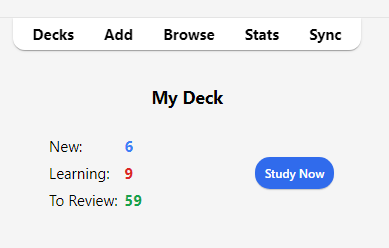I am not sure if I understand your situation, but I have a few guesses why your beginning review count is much higher than 2.
- Reviews ≠ cards reviewed. Your reviews are the number of times you will be shown a card to grade.
- The 'Maximum number of reviews per day' option limits the number of due (previously 'learned') cards that will be shown that day. This limit (rightfully) does not limit the number of reviews (the number on the graph). This is because
- When you have a card that is in a 'learning' or 'relearning' stage, that card can come up an unlimited number of times if it is never marked correct enough times in a row to become a 'learned' card (which is basically a card that functions normally according to the Anki algorithm). Because your learning intervals for your cards (
15 1440 4320in minutes and1/96 1 3in days) are long enough to span multiple days, you can get very high numbers of reviews relative to your number added per day and due review limit. Even if you never get any wrong (which your's doesn't as it is at 70 92 92), the number of reviews per day is 4 (3 learning steps for each card and one review each day) . With your settings, I ran a simulation for 9999 days with 1 new card per day. The average number of reviews per day was 5. This makes sense because1 (see new card for the first time) + 1 (due review) + ~3 (average learning steps for each card taking in to account imperfection) = 5 total.
If you want to ensure exactly 2 reviews per day you would need to have exactly 1 learning step. That way you would see the card once, it would become known, and show up tomorrow as a review (when you would once again add 1 card).
 As you can see, 77% of the cards were mature by 26 days, so that is a good estimate of how long it will take most of your cards to mature given the success rates in your simulation.
As you can see, 77% of the cards were mature by 26 days, so that is a good estimate of how long it will take most of your cards to mature given the success rates in your simulation.


 Image from
Image from
Just wanted to know if there are 100(for example) cards in a deck and my reviews and new card reading is limited by the no of hrs i spent on Anki (for example i can only do 2 cards per day) and given my retention rates as below in image, Can i know by when will i mature these cards ?
What i dont understand is why are my reviews so much higher initially that i definately cant achieve doing in future(and more than the settings i.e New cards per day and Reviews per day)? Am i doing something wrong ? My study plan dosnt give me that much time to spend on anki (but anki-ing is necessary)
Thanks !